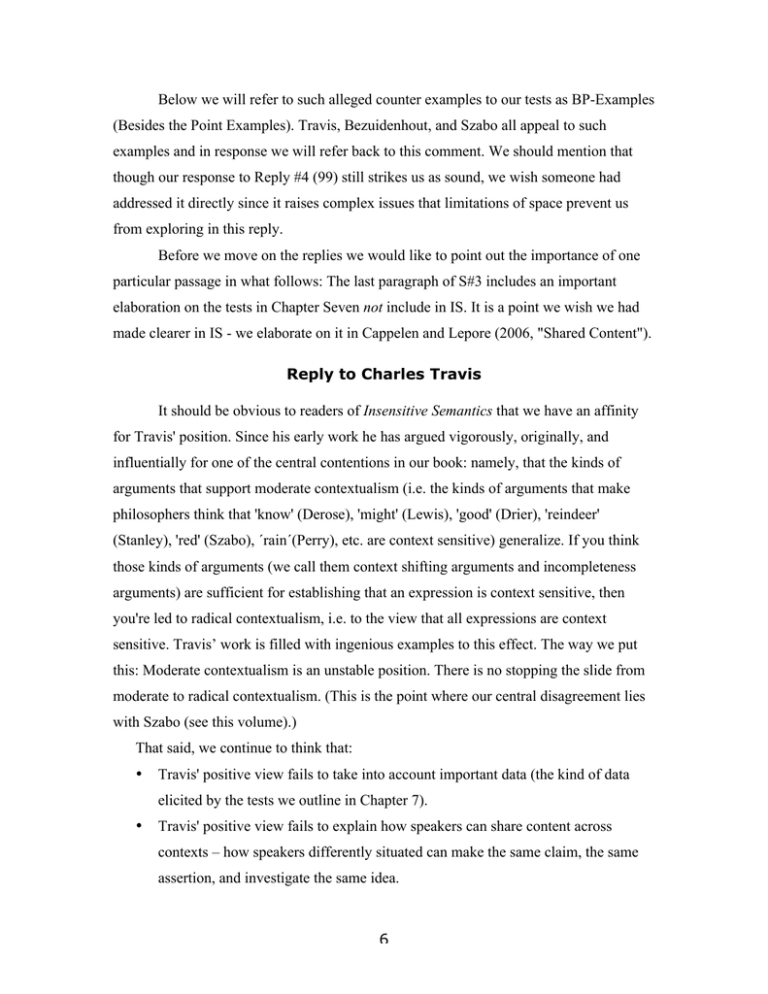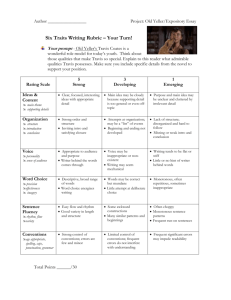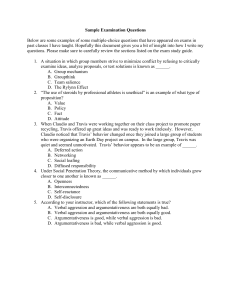Below we will refer to such alleged counter examples to... (Besides the Point Examples). Travis, Bezuidenhout, and Szabo all appeal...
advertisement

Below we will refer to such alleged counter examples to our tests as BP-Examples (Besides the Point Examples). Travis, Bezuidenhout, and Szabo all appeal to such examples and in response we will refer back to this comment. We should mention that though our response to Reply #4 (99) still strikes us as sound, we wish someone had addressed it directly since it raises complex issues that limitations of space prevent us from exploring in this reply. Before we move on the replies we would like to point out the importance of one particular passage in what follows: The last paragraph of S#3 includes an important elaboration on the tests in Chapter Seven not include in IS. It is a point we wish we had made clearer in IS - we elaborate on it in Cappelen and Lepore (2006, "Shared Content"). Reply to Charles Travis It should be obvious to readers of Insensitive Semantics that we have an affinity for Travis' position. Since his early work he has argued vigorously, originally, and influentially for one of the central contentions in our book: namely, that the kinds of arguments that support moderate contextualism (i.e. the kinds of arguments that make philosophers think that 'know' (Derose), 'might' (Lewis), 'good' (Drier), 'reindeer' (Stanley), 'red' (Szabo), ´rain´(Perry), etc. are context sensitive) generalize. If you think those kinds of arguments (we call them context shifting arguments and incompleteness arguments) are sufficient for establishing that an expression is context sensitive, then you're led to radical contextualism, i.e. to the view that all expressions are context sensitive. Travis’ work is filled with ingenious examples to this effect. The way we put this: Moderate contextualism is an unstable position. There is no stopping the slide from moderate to radical contextualism. (This is the point where our central disagreement lies with Szabo (see this volume).) That said, we continue to think that: • Travis' positive view fails to take into account important data (the kind of data elicited by the tests we outline in Chapter 7). • Travis' positive view fails to explain how speakers can share content across contexts – how speakers differently situated can make the same claim, the same assertion, and investigate the same idea. 6 • Travis' positive view is internally inconsistent. So, as things stand, the world in which we endorse radical contextualism is pretty far away, and Travis’ reply doesn’t render it any closer. We address his rely in five steps. T#1: Central Disagreement with Travis: Neat Answers Travis says: Suppose one asked, ‘Just what is this thing, being coloured blue? What way for a thing to be is that?’ A neat answer might be: ‘It is that way which a thing is iff C’, where ‘C’ stated a condition which was met by (and only by) some determinate class of things. Travis says no neat answer is available. There's no substitute for 'C' that would make that formula true. This is a point of disagreement because we think there is a reply, a very simple one, namely: (NA1) Being blue is that way which a thing is iff it is blue. (NA2) Being blue on the outside is that way which a thing is iff it is blue on the outside. or in our preferred terminology: (NA3) An object satisfies 'x is blue' iff it is blue. (NA4) An object satisfies 'x is blue on the outside' iff it is blue on the outside. Not particularly informative, but who can deny their truth? Here we would like to add a ground rule to those that Travis introduces: To refute NA1 and NA3 you need to convince us that the bi-conditionals are false. How would you do that? You need to find an object that satisfies 'being blue' but isn't blue (or the other way around). The same goes for NA2 and NA4: you need to find an object that satisfies 'x is blue on the outside' but isn't blue on the outside. We have seen no such counter example from Travis. That is the only way to refute NA1-4. It is useful here to consider Travis claim that any neat solution would be reductionist. A neat answer, he says, would amount to: … a sort of reduction of being blue, or being a grunter, to something else … I see no more hope for such a reduction than there is generally for reductions of anything to anything else. Read that way, Bishop Butler had the right idea 7 We don't think Travis is on the side of Bishop Butler here. It is Travis who assumes a neat answer would have to be 'a sort of reduction'. He assumes that because he doesn't even consider NA1-4 as possible; he doesn't take seriously the possibility that we can use the term in question to specify the conditions under which that term can be applied. That is what a non-reductionist solution would amount to – it would not be one that tried to specify C without using the terms 'blue' or 'blue on the outside'. In the final part of his comments, Travis considers our non-reductionist answer and rejects it because we don’t tell him what it is to be blue (or blue on the outside or a grunter). Our only strategy, he says, is ‘studied silence’: They utter certain forms of words—’The sentence ‘Sid grunts’ expresses the proposition that Sid grunts, which is true iff Sid grunts’ will do as illustration. But they emphatically refuse any explanation as to what it is they thus said. What they pretend to have said is what proposition ‘Sid grunts’ expresses, and when it would be true. But if one feels left in the dark by that, they have no help to offer. Warning: No semanticist should come to Travis’s aid here. We'll borrow a formulation of Travis' (he uses it is response to a move he imagines us making): … [our] only answer is that if you are one of us (say, a speaker of some language enough like English), then that is something you are prepared to recognize. If you are not, then [we] have no formula—as it were, a cognitive prosthetic—to offer you with which to replace such competence. I.e., if Travis claims not to understand 'blue' or 'blue on the outside', no one can help him. That's something we each know qua English speakers. Ask yourself: Do you really think you don't understand, for example, the use of 'blue on the outside' in NA2 and NA4? Isn’t it simply a part of being competent in our language that you grasp such fundamental truths? NB: Understanding, of course, does not require recognition. At this point we're afraid our readers might get the sense that what we have reached a sort of stand off. We claim to understand 'blue on the outside' in NA2 and NA4, Travis claims not to (or if he understands it, then only 'in a certain way' (which would make the formula false)). Is there a way to resolve our apparent standoff? We suspect Travis' strategy will be to construct a range of cases that exhibit different understandings 8 of 'blue on the outside'. We, in response, will insist that such stories do not constitute counter-examples to NA2/4 unless they are cases where 'blue on the outside' clearly applies, even though the object in question isn't blue on the outside (or the other way around.) We've seen no such case, but we're open-minded. T#2: On how to understand Travis' use of the predicate 'being blue' Before we leave the above topic, we'll briefly point out a potentially problematic feature of Travis view (though this might just be our not fully understanding what he has in mind). Here's a kind of sentence that can be found throughout Travis' reply: (T) ‘is blue’ speaks of being (coloured) blue. How are we to understand the words 'being (coloured) blue’ in that sentence? We know that Travis thinks (T) is meaningful (if it isn't, then huge chunks of his reply aren't meaningful). So 'being (coloured) blue' must have a semantic value (understood as loosely as you like). If we assume that (T) expresses a proposition, 'being (coloured) blue' must contribute something to that proposition. Call what it contributes a property, and call this property BCB. But then for (T) to be meaningful there must be a property, BCB, that all blue things instantiate. Now, we know that Travis doesn't think this, so there will be some way he thinks that expression can contribute meaningfully to his text without assuming that being (coloured) blue is a property. We would be curious to understand how that's supposed to work. T#3: Travis on Communication Our most fundamental disagreement with Travis is over what it is for people to understand each other. We claim radical contextualists are stuck with a kind of context/content solipsism' where contents cannot be carried from one context of utterance to another. We claim radical contextualism implies that the same proposition can't be expressed by people differently situated. If Travis were right, it shouldn't, for example, be possible for us to say what Travis said, and Travis shouldn't be able to say what we said. He describes our view as follows: 9 What communication requires, C&L suppose, is that from the fact that Max said, on some occasion, ‘Sid grunts’, of Sid (at time t), those words meaning in Max’s mouth what they do mean, one can extract what it is that Max thus said to be so. If this means that in order to communicate, an audience must (typically) understand what the speaker said, this certainly is a view we endorse. We endorse a number of other views we find early obvious, like the following: • It is possible for you, our reader, to understand what we say and assert in this reply. • It is possible for you to agree or disagree with what we said and assert in this reply. • It is possible for you, wherever you may be, to tell someone else what we said in this reply. It is not true that the best you can do is get close to what we say in this reply, or retrieve a thought merely similar to what we say in this reply. You can actually understand what we say. This might be a wild and radical view, but it's our view. It appears not to be Travis'. Travis’ positive view of communication is not presented in this reply, but we get a flavor of it from the following passage: On the [radical contextualism] view, though, communication just isn’t like that. True, Max’s words are worth little to me if I know nothing of the circumstances in which he spoke. But knowing something of them may be enough to know something of what is to be expected if things are as he said. Which may, if things go well, make them quite useful to me. Accordingly, we can never grasp exactly what another says; we can only muster something similar; something that'll do for whatever purpose we're up to. We are then to reject the model of successful communication as requiring sharing thoughts; rather, successful communication is just getting along in the right kind of way. In IS, we advance a battery of arguments for why we abhor this way of construing communication. Our forthcoming book, Shared Content and Semantic Spin, is devoted 10 solely to this important topic. Limitations of space prohibit a full presentation of our arguments (along with the different moves a radical contextualist might invoke in order to mitigate contextual content solipsism), but here are some important considerations. It is essential to our linguistic practices that others can say what we say: o Responsibility: we hold people responsible for what they said, not for what they almost or 'sort of' or partly said. o Reasons for Actions: what other people say can provide reasons for actions and enter into our practical reasoning - what they almost said or something similar to (or part of) what they said can't play this role. o Justifying knowledge: what others say often justifies our beliefs and provides the basis for knowledge – something relevantly similar to (or part of) what they said can't serve this same function. o Coordinated Action: language can be used to tell many people what it is they all need to do in order to achieve some common goal – this requires the participants to receive and to follow identical instructions, not merely similar ones. o Intra-Personal Deliberation: as we deliberate over time, we presuppose that contents are preserved from one context of deliberation to another. We find it peculiar that a theorist who professes to be so devoted to close attention to linguistic practices (in the sense that Travis is Wittgensteinean) is willing to relinquish these most foundational features of our communicative and social practices; in particular, we find it shocking that Travis is willing to reject that component of our selfunderstanding as linguistic creatures that require that we are capable of understanding each other across contexts. Of course, it's possible that Travis has a reply to all such worries. We'd like to see it. T#4: Travis on MA One issue should be quite easy to clear up: We claim that Travis, with other radical contextualists, endorsees a version of the thesis we call (MA) (see Travis’ contribution and IS (53-58)). About this 'accusation', Travis says: ‘Incredibly, C&L 11 accuse me specifically of holding MA. I cannot imagine why.’ In the very next sentence he goes on to imagine why, and he gets it basically right: Perhaps it is because I think that if a sentence were true under such-and-such conditions, and you spoke it where those conditions obtained, you would say something true. That sounds about right. But of course I do not think that, in that sense, any sentence does have a truth condition. The sense in which Travis endorses MA is this: a central claim throughout his work is that a semantic theory, understood as a theory about the properties of sentences (the abstract objects) will not generate something that can be true or false. Nor is there anything general that can be said about how a sentence in a context ends up saying what it says (semanticists won't be able to articulate the function that takes us from a sentence and a context of utterance to the proposition expressed by that utterance). Semantics, according to Travis, cannot deliver truth conditions. Travis uses that conclusion against, for example, Davidson's truth conditional theory of meaning, Grice’s account of what is said, and what he calls the Carnapean and Montagovian tradition in philosophy of language. It is clear, therefore, that he thinks of this as a criticism of these semantic projects. Were they to be successful, they should deliver something truth evaluable. If Travis didn't think this, his argument (conclusion) sketched above, wouldn’t constitute a criticism. Hence, we place him as endorsing MA (and of course, that's perfectly compatible with his saying, ‘I do not think that, in that sense, any sentence does have a truth condition’. T#5: Travis on Tests for Context Sensitivity In §4 of his reply, Travis attempts to show that all the tests we invoke as objections to radical contextualism fail. We assume limitations of space must have prevented Travis from elaborating, but as they stand all of his arguments are instances of BP-Examples (discussed in General Comments #4 above). Like Recanati (below), he might object to our reply on (99), but the debate cannot advance unless we're told what the objection might be. 12



